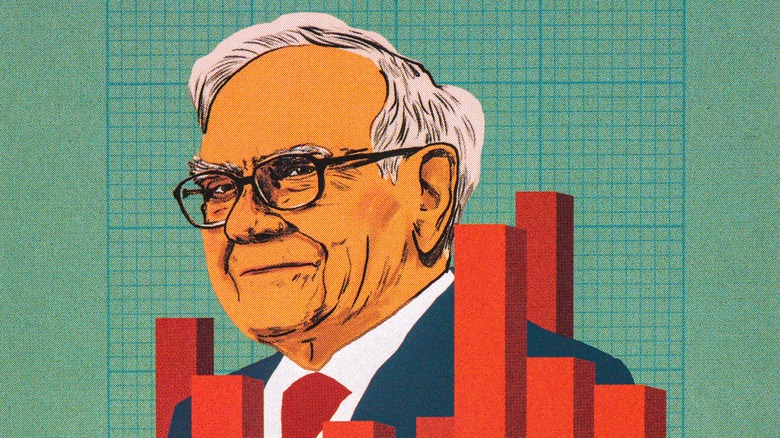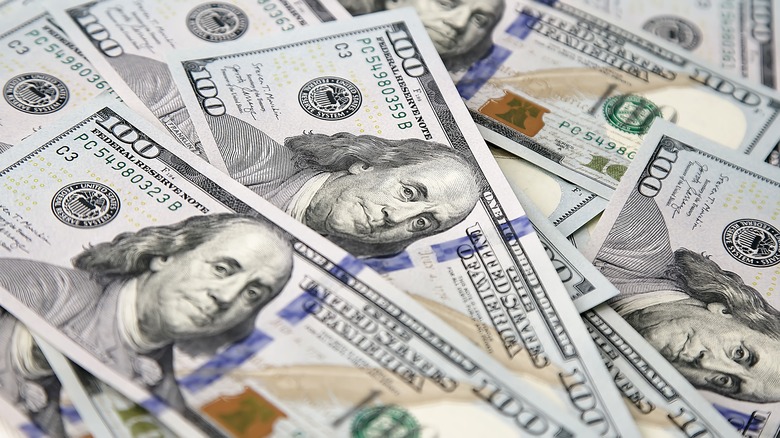The Pricey Gift Warren Buffett Quit Giving His Family For Christmas
The Oracle of Omaha is famously frugal. Warren Buffett the investor is worth an estimated $143.7 billion. But Buffett the consumer spends as if he were a commoner, living in a home worth roughly $650,000 (and in true Buffett fashion, purchased for $31,500 in 1958). He once told an interviewer from the BBC, "I'm happy there. I'd move if I thought I'd be happier someplace else," keeping with the spirit of the man's authenticity and direct style of thinking and doing. Warren Buffett is a uniquely potent source of inspiration for managing personal finance decisions, and it turns out he's in his own realm among "celebrity finance experts" in garnering the respect of other professionals in the industry.
In breaking from his usual frugality, Buffett was once an extravagant gift giver when the Christmas holiday rolled around. Each year, he'd give his family members an expensive present and share in the good fortunes that he had created for himself. But one year, things changed, according to an account by Mary Buffett, his former daughter-in-law. The evolved gift giving from Buffett is quite a surprise, not because he became less generous, but rather because his alternative was far more of a classic Warren Buffett move, making an outside observer wonder why an investor famous for sitting with his thoughts hadn't come up with this approach sooner.
Warren Buffett routinely gifted mountains of cash
In a 2019 interview with ThinkAdvisor, Mary Buffett recounted how she and the rest of Warren Buffett's family would be gifted $10,000 in $100 bills every Christmas. It was a direct infusion of cash to spend however they wished, enriching their lifestyle tremendously in the process. She also notes that her gift to him the first Christmas she found herself a part of the family was a deep dive into the accounts of her own business, showing him that she was a worthy business mind in her own right. Financial literacy and a balanced budget are clearly key sentiments in the Buffett household, and he surely would have appreciated the thoughtful gift – knowledge for the sake of it, once again tying seamlessly into the persona of who Warren Buffett is at his core.
But one year Buffett opted to give his family members letters, instead. The note spoke of a different kind of gift, still worth $10,000 but organized in a different manner. Eventually, the investor decided to gift shares in companies he had recently purchased, the first year was a $10,000 piece of a Coca-Cola trust. Cashing out was, of course, an option, but so too was keeping the equity intact and riding the stock market's performance. Buffett's gift had effectively transformed from a singular presentation of money into a twofold experience featuring both wealth and a learning opportunity.
Shifting to shares was Warren's way of imparting wealth, not just money
The change is impeccably suited to Warren Buffett's personality. The gift of shares allows the recipient to cash out and take the value today, or hold onto the asset and potentially balloon the monetary value. A $10,000 gift in cash is easy to spend; you might purchase a new car or update the furnishings in your home. Or you might opt to splurge the newly acquired funds on a vacation or season tickets to see your favorite team (something Jim Cramer actually advocates splurging on, sometimes). The money can be used to buy additional value and enjoyment in your life, and as a cash gift it's easy to see and utilize the capital in this way.
However, as an investment a gift like this becomes a choice. The added value being imparted upon you doesn't change your bank account or wallet directly. Tied up in an investment, there's no financial alteration to your daily life, allowing you to leave it there without any consequence. An investment retained is one that's given the breathing room necessary to grow. Infusing his family's portfolios with new investments every year allowed Buffett to enrich their lives, and potentially with exponential effect if they decided not to cash in the value. For her part, Mary Buffett opted to hold onto the shares, and often bought more of the stock in question, believing in Warren's stock picking instincts. For him, she noted, he targets companies whose "earnings go up steadily a little bit every year and continue."


